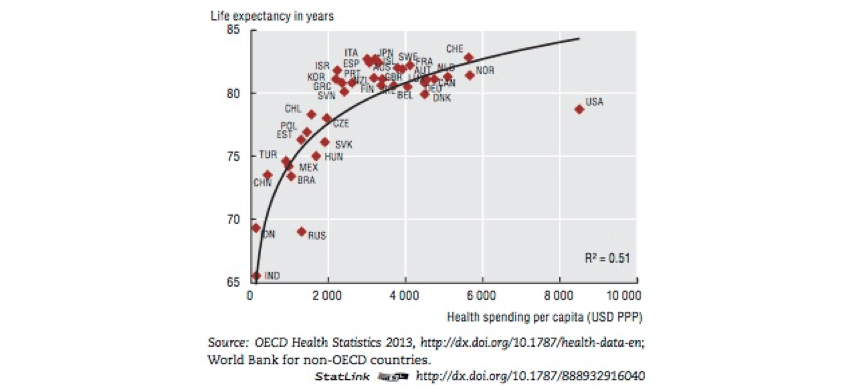How Big Data is Reducing Costs and Improving Outcomes in Health Care
- by 7wData

Health care costs are driving the demand for big-data driven Healthcare applications. U.S. health care spending has outpaced GDP growth for the past several decades and exceeds spending in any other developed country. Despite being more expensive, according to the Organisation for Economic Co-operation and Development (OECD), the US Health System ranks last among eleven countries on measures of access, equity, quality, efficiency, and healthy lives. Standards and incentives for the digitizing and sharing of healthcare data along with improvements and decreasing costs in storage and parallel processing on commodity hardware, are causing a big data revolution in health care with the goal of better care at lower cost.
A goal of the Affordable Care Act is to improve health care through the meaningful use of health information technology in order to:
Health Insurance companies, Medicare and Medicaid are shifting from fee-for-service compensation to value based data driven incentives that reward high quality, cost effective patient care and demonstrate meaningful use of electronic health records.
Unstructured data forms about 80% of information in the healthcare industry and is growing exponentially. Getting access to this unstructured data—such as output from medical devices, doctor’s notes, lab results, imaging reports, medical correspondence, clinical data, and financial data—is an invaluable resource for improving patient care and increasing efficiency.
Examples of healthcare data sources that will benefit from big data and analytics:
There is a move toward evidence-based medicine, which involves making use of all clinical data available and factoring that into clinical and advanced analytics. Capturing and bringing all of the information about a patient together gives a more complete view for insight into care coordination and outcomes-based reimbursement, population health management, and patient engagement and outreach.
The cost of fraud, waste and abuse in the healthcare industry is a key contributor to spiraling health care costs in the United States, but big data analytics can be a game changer for health care fraud. The Centers for Medicare and Medicaid Services prevented more than $210.7 million in healthcare fraud in one year using predictive analytics. UnitedHealthcare transitioned to a predictive modeling environment based on a Hadoop Big Data platform, in order to identify inaccurate claims in a systematic, repeatable way and generated a 2200% return on their big data/advanced technology.
The key to identifying fraud is the ability to store and go back in history to analyze large unstructured datasets of historical claims and to use machine-learning algorithms to detect anomalies and patterns.
Healthcare organizations can analyze patient records and billing to detect anomalies such as a hospital’s overutilization of services in short time periods, patients receiving healthcare services from different hospitals in different locations simultaneously, or identical prescriptions for the same patient filled in multiple locations.
The Centers for Medicare and Medicaid Services uses predictive analytics to assign risk scores to specific claims and providers, to identify billing patterns, and claim aberrancies difficult to detect by previous methods. Rules-based models flag certain charges automatically. Anomaly models raise suspicion based on factors that seem improbable. Predictive models compare charges against a fraud profile and raise suspicion. Graph models raise suspicion based on the relations of a provider; fraudulent billers are often organized as tight networks.
Initiatives such as meaningful use are accelerating the adoption of Electronic Health Records and the volume and detail of patient information is growing rapidly.
[Social9_Share class=”s9-widget-wrapper”]
Tags
You Might Be Interested In
How Big Data is Reducing Costs and Improving Outcomes in Health Care
26 Nov, 2016Health care costs are driving the demand for big-data driven Healthcare applications. U.S. health care spending has outpaced GDP growth …
How Big Data is Reducing Costs and Improving Outcomes in Health Care
26 Nov, 2016Health care costs are driving the demand for big-data driven Healthcare applications. U.S. health care spending has outpaced GDP growth …
How Big Data is Reducing Costs and Improving Outcomes in Health Care
26 Nov, 2016Health care costs are driving the demand for big-data driven Healthcare applications. U.S. health care spending has outpaced GDP growth …
Recent Jobs
Do You Want to Share Your Story?
Bring your insights on Data, Visualization, Innovation or Business Agility to our community. Let them learn from your experience.
Privacy Overview
Get the 3 STEPS
To Drive Analytics Adoption
And manage change


